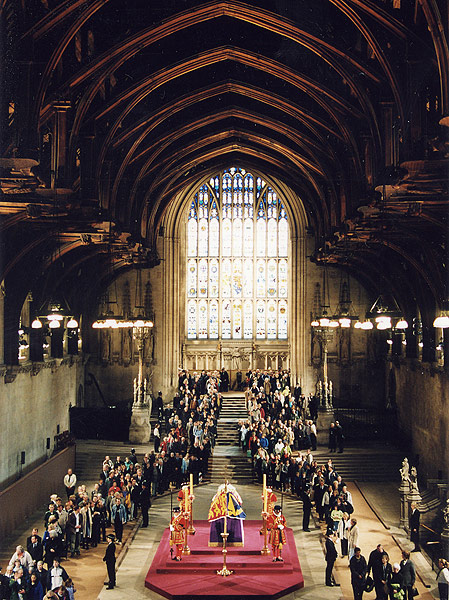Reactions to the death of Queen Elizabeth seem to contradict the familiar claim that, ‘Death is nothing at all’. In recent decades, cards of sympathy and condolence, or readings at funerals and memorial services, have told us that,
“Death is nothing at all. It does not count. I have only slipped away into the next room. Nothing has happened. Everything remains exactly as it was. I am I, and you are you, and the old life that we lived so fondly together is untouched, unchanged… Why should I be out of mind because I am out of sight? I am but waiting for you, for an interval, somewhere very near, just round the corner. All is well…”
These sentiments have comforted some but others dismiss them as trite or as wrong. Their author was Professor Canon Henry Scott Holland, a Canon of St Paul’s Cathedral in London who became Regius Professor of Divinity at the University of Oxford. He declined the offer of a bishopric but was highly influential on William Temple and others at the cusp of theology and politics as a social reformer, especially as founder of the Christian Social Union.
So how did a Christian cleric come to write words which irritate many fellow believers? What world was Henry Scott Holland living in, if he thought that death was nothing at all? When those words are quoted, the context is usually omitted but that is highly relevant to our mourning for Queen Elizabeth. He was preaching in St Paul’s on Whit Sunday, 15 May 1910, after King Edward VII had died on 6 May and just before the first royal lying in state in Westminster Hall on 17 May and the funeral on 20 May. It was a poignant moment for the church to speak profoundly to the world.
Henry Scott Holland began by saying, ‘I suppose all of us hover between two ways of regarding death’, of which the famous ‘death is nothing at all’ was the second. The first approach was the exact opposite, to ‘recoil from it as embodying the supreme and irrevocable disaster’.
How did Scott Holland resolve the tension between these two extreme views of death?
“Our task is to deny neither judgement, but to combine both… Only through their reconciliation can the fitness of our human experience be preserved in its entirety.”
It is not a fair reading of Henry Scott Holland to take one half of the two positions he was contrasting and represent that as the whole, as if he did not understand the other approach, when he had in fact already set it out in his sermon. The sermon captured the moods of the nation precisely because it was a special time in the life (and reflection on death) of the country, when the king was dead and yet when the cry went up, ‘Long live the King!’
Of course, the poetry of Henry Scott Holland’s words contributed to this effect. He was so eloquent in his choice of words, to represent a position that he did not hold, that the view has come to be associated with him.
We have the opportunity now to lay to rest not only Queen Elizabeth but also such partial understandings of Henry Scott Holland’s rounded exploration of the natural human reactions to death. The full text of this sermon, ‘Death The King of Terrors’ can be easily found on-line. It bears reading on the eve of this state funeral and in the months and years which follow. For the preacher recognised that death is not met by the bereaved with only one of these opposing views once and for all. At the bedside, at the funeral, one approach might prevail but in the following months, the other extreme might be encountered.
Hence death, as here, ‘may come to the very old as the fitting close of an honourable life’, in which case it is often possible to come to appreciate that,
What really matters is the life with its moral quality, its personal characteristics, its intense and vivid charm, its individual experiences, its personal story; the tone of its voice, the pressure of its presence felt as surely now as once through eye and hand; the tenderness, the beauty, the force of the living will — its faults, and its struggles, and its victories, and its maturity, and its quivering affection.
Even then, there will be times when the bereaved are ‘drawn under the drag of days, submerged, unnerved, wearied, out of spirits, disheartened’.
The royal family, churches, diverse faith communities, secular politicians, the wider public and the whole world have found, in response to the Queen’s death, a dignity, appreciation and compassion which is uplifting. All of this will help other families cope with griefs as best we can and will help us to enjoy life’s graces while anticipating the deaths of one another and of ourselves.
Just as Queen Elizabeth showed us there is so much to life, reactions to her death are helping us understand, as Henry Scott Holland appreciated, that death is indeed quite something, after all.
Simon Lee is Professor of Law at Aston University & Chair of the Trustees of the William Temple Foundation s.lee19@aston.ac.uk Twitter @paradoxbridge
More blogs on religion and public life
- Faith and Voting: The UK general election 2024
by Matthew Barber-Rowell - Labour and Faith – Brave New Reset or Faith-Washing?
by Chris Baker - Lessons for an election year from the Bishop of Unity
by Ian Mayer - Food, hope and love: the local church in a time of crisis?
by Paul Monk - Radical hope in the midst of poverty in the city
by Grace Thomas

Discuss this